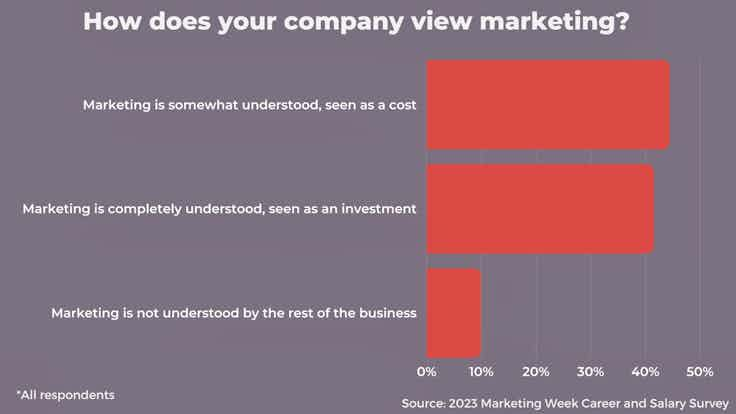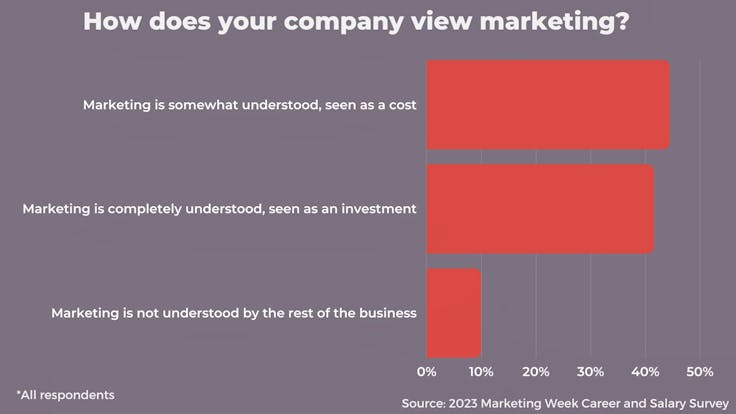Job satisfaction, marketing as a cost: 5 interesting stats from Salary Survey 2023
The 2023 Career and Salary Survey reveals marketing is still seen as a cost – rather than an investment – by some brands, while marketers are ramping up their search for a good working environment.
 Marketing is often still seen as a cost by brands
Marketing is often still seen as a cost by brands
Despite all the work marketers have done from an effectiveness perspective to demonstrate the value of their work as an investment – rather than a cost – perceptions within the wider business appear slow to change.
Exclusive data from the 2023 Marketing Week Career and Salary Survey reveals almost half (44.4%) of the more than 3,000 marketers surveyed say marketing is only somewhat understood by their company and is seen as a cost.
In better news, 41.5% of the sample claim marketing is completely understood by their company and is at the heart of everything it does, meaning it is viewed as an investment.
Thankfully, a far smaller number of respondents (9.9%) report marketing is not understood by the rest of the business.
These numbers matter in the context of the current inflation crisis, especially given marketing budgets will likely be squeezed harder in companies where the function is seen as a cost, rather than a long-term investment.
Source: 2023 Marketing Week Career and Salary Survey
Good working environment top job characteristic for marketers
 After a turbulent few years, it makes sense that a good working environment would be the top characteristic marketers look for in a job.
After a turbulent few years, it makes sense that a good working environment would be the top characteristic marketers look for in a job.
Almost two thirds of respondents (63.2%) say a good working environment is very important to them, followed by fair financial rewards (59.1%) and the opportunity to advance their career (52.3%).
Access to flexible/hybrid working is very important to almost half (49.8%) of the sample, followed by job security (44.9%), autonomy in their role (41.6%) and finding a company which shares their values (33.3%).
Close to a third (30.1%) of marketers say training is a very important job characteristic for them, followed by the location of the role (29.1%), engaging in challenging work (29%) and working with desirable brands, products or clients (25.3%).
Less than a quarter of respondents consider an adequate performance review structure (22.8%) to be very important, while a culture which encourages measured risk-taking (19.9%) comes in as the least important job characteristic for marketers.
Source: 2023 Marketing Week Career and Salary Survey
Most marketers plan to stay in the profession for at least the next two years
 Some 87% of the more than 3,000 marketers responding to the exclusive 2023 Career and Salary Survey are likely to stay in the marketing profession for the next one to two years.
Some 87% of the more than 3,000 marketers responding to the exclusive 2023 Career and Salary Survey are likely to stay in the marketing profession for the next one to two years.
This number rises to 91.5% of marketers working in large organisations (250 employees and over), but dips among their SME peers (83.8%). Marketers working for B2B businesses (85.1%) appear slightly less likely than their B2C counterparts (86.4%) to say they will stay in the profession for at least the next two years.
Young marketers also appear slightly more open to changing professions than their older peers. Some 83.7% of marketers classed as Gen Z (aged 26 and under) plan to stay in marketing for the next two years, compared to 86.8% of millennial marketers and 90.2% of those within the Gen X demographic.
Female marketers, who make up 60.1% of the total sample, appear much more likely to want to stay in the profession over the next one to two years (91.2%) than their male peers (79.8%).
Source: 2023 Marketing Week Career and Salary Survey
Change of direction and desire to learn new skills top reasons for leaving role
 According to Marketing Week’s exclusive research, more than a quarter of marketers (27.3%) have been in their role for 12 months or less.
According to Marketing Week’s exclusive research, more than a quarter of marketers (27.3%) have been in their role for 12 months or less.
For those who have recently changed jobs, 26.3% were looking for a change of direction, while a further 26.3% wanted to learn new skills and 21.3% were attracted by a new business culture.
The pandemic was a factor for 16% of respondents, who changed roles after rethinking their priorities post-Covid, while 15.2% were looking for a business aligned with their personal views.
A further 14.5% recently changed roles in search of flexible working, while 13.9% were looking for a change of location and 8.6% were forced to look for a new job after being made redundant.
The statistics suggest that, three years on from the onset of Covid, many marketers are craving change and the ability to branch out to learn new skills.
Source: 2023 Marketing Week Career and Salary Survey
Most marketers happy in their current role, although disparities persist
 More than half (53%) of marketers are considering a change of role in 2023, down slightly from 56.9% who were mulling a job search last year.
More than half (53%) of marketers are considering a change of role in 2023, down slightly from 56.9% who were mulling a job search last year.
That said, well over half of marketers also say they are happy in their current role. Some 61.5% of the total sample report being quite or very happy in their current position. This number rises to 63.6% of female marketers and dips slightly to 60.3% of their male peers.
Given the issues Marketing Week has highlighted around the persistent ethnicity pay gap (10.3%) and socio-economic pay gap (18.2%) within marketing, the happiness stats do show some divergence when examined in terms of racial and socio-economic diversity.
While 63.8% of white marketers are happy in their current role, this figure drops to 47.2% of marketers who identify as coming from mixed/multiple ethnic groups and 49.6% among Asian and Asian British marketers.
Similarly, 58.5% of marketers identifying as coming from a working class background feel happy in their job, lower than their middle class (61.6%) and upper-middle/upper class peers (69.5%).
Source: 2023 Marketing Week Career and Salary Survey
Check out the latest 2023 Career and Salary Survey content here
 Marketing is often still seen as a cost by brands
Marketing is often still seen as a cost by brands





